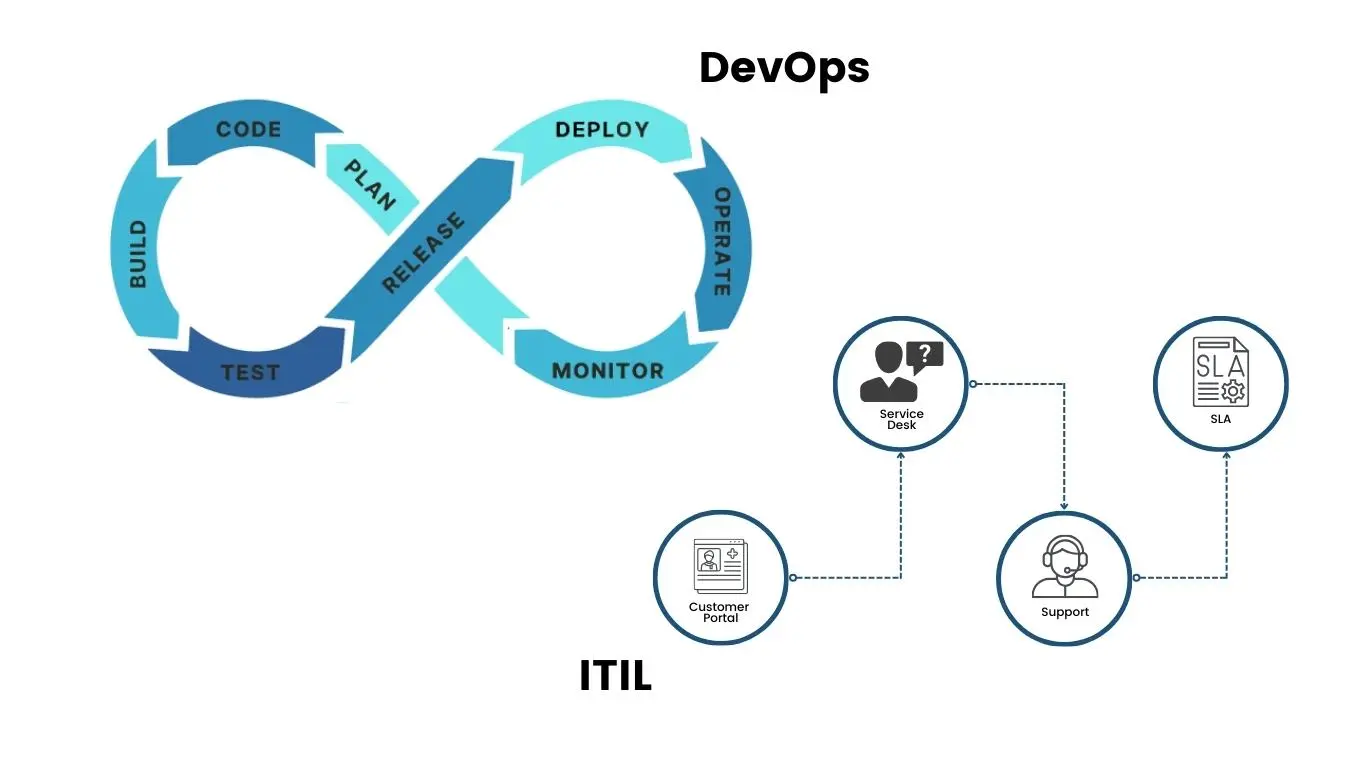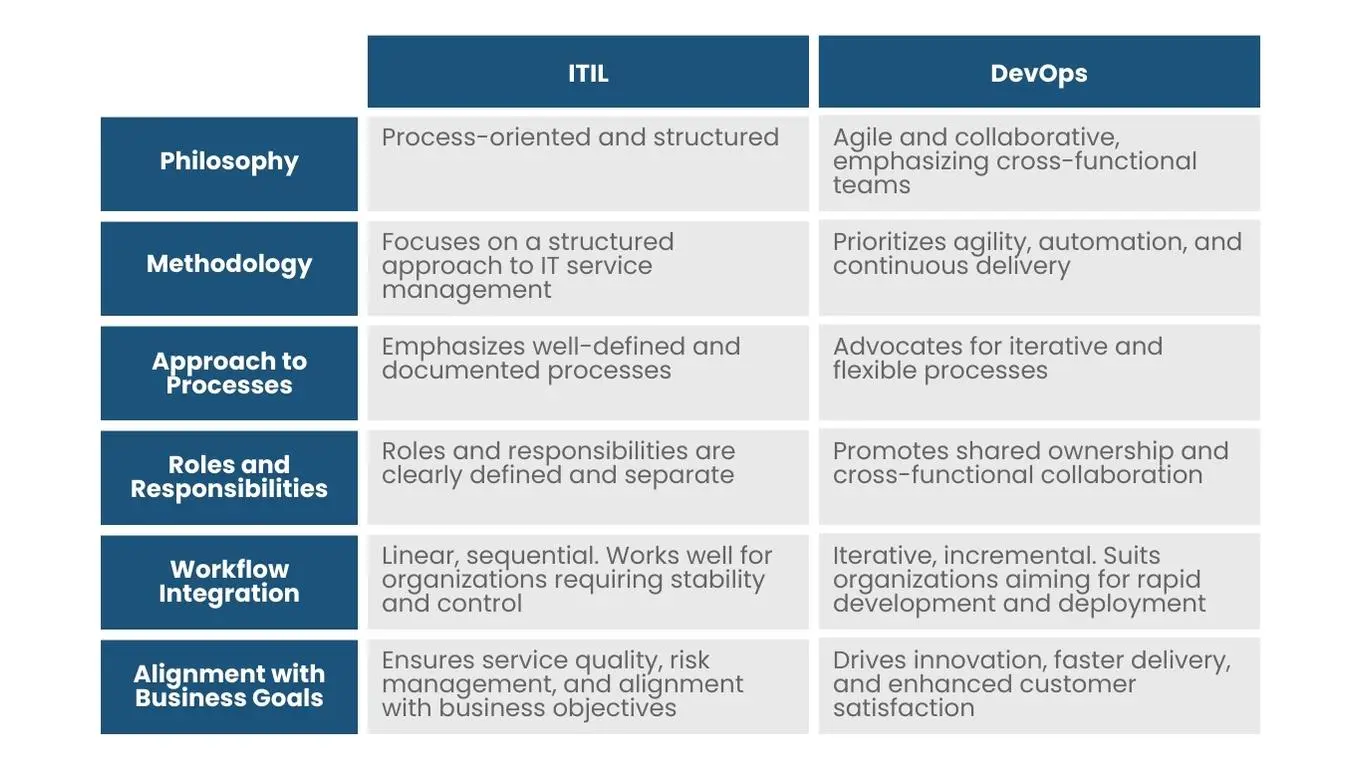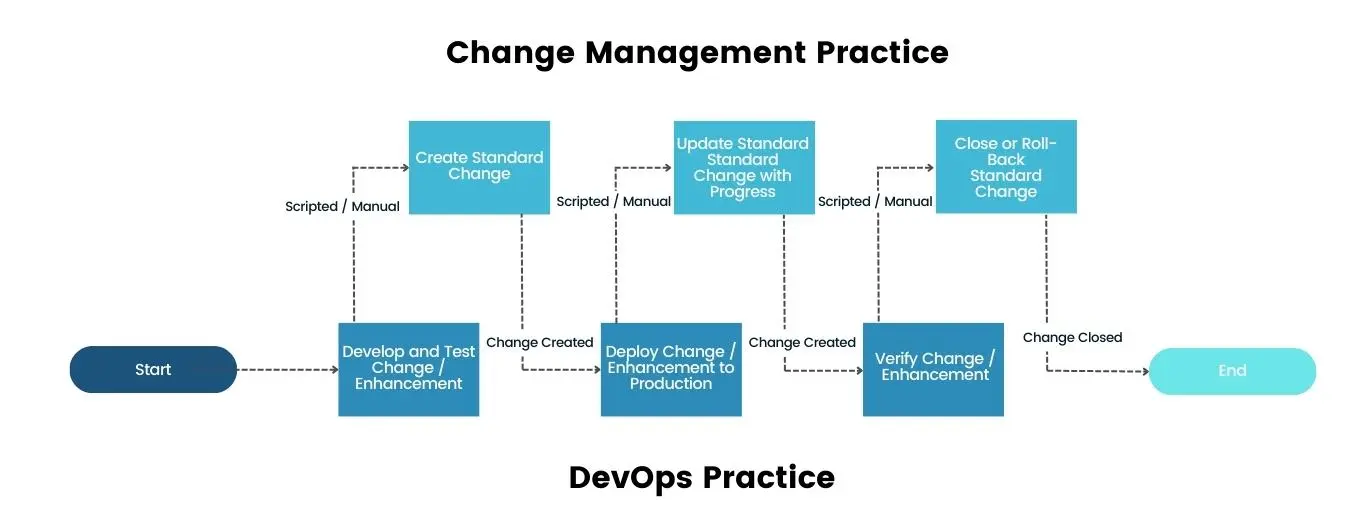Think back to 17 years ago. The century was just beginning, no Facebook, no Twitter, no well-defined software development process. In the context of our recent materials, the DevOps framework looks like some kind of hero savior who pulled the darkness of development and operations team interaction into the light. However, DevOps was not the first attempt to tackle these challenges. IT Service Management (ITSM) and Information Technology Infrastructure Library (ITIL) have been doing their part for decades.
ITIL is a well-established framework for IT service management that emphasizes a structured and process-driven approach. It has been the backbone of IT operations for many enterprises, providing a systematic way to deliver and support high-quality IT services. On the other hand, DevOps is a more recent innovation characterized by its emphasis on agility, automation, and collaboration between development and operations teams. DevOps aims to break down traditional silos, accelerate software development, and enhance the overall delivery pipeline.
A survey by IDC revealed that 67% of IT organizations have adopted DevOps practices to some extent. Simultaneously, a study by no longer existed Axios Systems indicated that 61% of IT professionals still rely on ITIL for IT service management. This statistical divergence underscores the ongoing debate within the industry, highlighting the need for a comprehensive understanding of both methodologies and the advantages they offer to enterprises.
Understanding ITIL and Its Benefits
ITIL provides a framework to align IT services with the needs of the business and improve overall efficiency and effectiveness. Like a guidebook for managing IT services. Yeah, in guides we trust.
Key Principles and ITIL Methodologies
Service Lifecycle: Strategy, Design, Transition, Operation, Continual Improvement.
ITIL follows a service lifecycle approach, which starts with aligning IT services with the organization's goals and then goes through the process of designing, implementing, and operating those services. And, of course, it's all about continuous improvement because people always believe they can do better.
ITIL Processes: Change Management, Incident Management, Problem Management, etc.
Within each stage of the service lifecycle, ITIL defines various processes to handle specific aspects of IT service management. Simply put, it’s all about change management in the IT environment, incident management, and problem management to identify and resolve the root causes of incidents. It's like having a set of superheroes ready to tackle any IT challenge that comes their way.
Approach and Benefits of ITIL
ITIL Principles and Framework: ITIL is founded on a set of best practice guidelines for IT service management. It provides a comprehensive framework with defined processes and roles, ensuring that IT services are aligned with business objectives. ITIL encompasses five core books, each addressing specific IT service management areas: service strategy, design, transition, operation, and continual service improvement.
Structured Approach to IT Service Management: What distinguishes ITIL is its structured approach. It focuses on defining, implementing, and maintaining services to meet business needs while ensuring service quality, risk management, and cost-effectiveness. ITIL introduces key concepts such as service level agreements (SLAs), change management, and incident management, all aimed at ensuring the reliability and efficiency of IT services.
Benefits of ITIL for Enterprises: Enterprises adopting ITIL can reap a host of benefits. Firstly, it enhances service quality and customer satisfaction by establishing clear processes for service delivery and incident resolution. Moreover, ITIL aids in risk management, reducing the likelihood of costly disruptions. Additionally, ITIL ensures that IT services are closely aligned with business objectives, creating a strategic advantage.
Exploring DevOps and Its Advantages
DevOps stands for "Development" and "Operations," and it is a dynamic methodology and cultural shift that has gained ground in the IT world. DevOps framework is underpinned by several core principles, with a primary focus on fostering collaboration, automation, and continuous delivery.
Core and Salt of DevOps
DevOps is a collaborative approach that seeks to bridge the traditional gap between development and IT operations. Its principles can be summarized as follows:
Collaboration: DevOps encourages seamless collaboration between development and operations teams. This close-knit collaboration breaks down the silos that often hamper effective communication, ensuring a shared understanding of goals and a mutual commitment to delivering high-quality services.
Automation: Automation is the heartbeat of DevOps. It encompasses the use of tools and technologies to automate manual, repetitive tasks. This automation accelerates the software development and deployment process, reduces human error, and ensures consistency in operations.
Continuous Delivery: DevOps places a strong emphasis on continuous delivery. It involves a pipeline of automated processes for building, testing, and deploying software. This allows organizations to release new features, updates, and fixes more rapidly and reliably.
Why Organizations Could Do With DevOps
Frankly speaking, DevOps is a very compelling choice for enterprises looking to streamline their IT operations and drive business success. For this reason, the framework is used by Netflix, Google, and other tech leaders.
-
Faster Software Delivery: With DevOps, tech companies can release software at a much faster pace. They automate testing, integration, and deployment processes, so development teams can make code changes more swiftly and with greater confidence. This speed-to-market advantage can be a game-changer in today's fast-paced business environment.
-
Enhanced Innovation: DevOps creates an environment that fosters innovation. Collaboration between development and operations teams leads to the infusion of fresh ideas and diverse perspectives. This results in the rapid creation and deployment of innovative solutions, setting the stage for businesses to stand out in the digital landscape.
-
Improved Customer Satisfaction: No need to mention that customer satisfaction is paramount. DevOps, with its focus on rapid development and continuous delivery, ensures that customer feedback is promptly incorporated into the development cycle. You deploy code, release the product, receive feedback, make edits, and round off the circle with a new release. This customer-centric approach leads to enhanced customer satisfaction and loyalty.
Example: Netflix relies heavily on DevOps practices. The company deploys changes to its online platform 20K times a day, ensuring a seamless user experience and quick adaptation to market demands. This level of agility and responsiveness is a testament to how DevOps can empower organizations to excel in the digital realm.
Points of Comparison: ITIL vs. DevOps
We’ve created a table that clearly compares ITIL and DevOps, highlighting their key differences in philosophies, methodologies, approaches to processes, roles, and workflows, as well as their unique contributions to enterprise needs.
How ITIL and DevOps Address Different Needs
ITIL and DevOps address different needs within an enterprise. ITIL is well-suited for organizations that need a structured and standardized approach to ITSM. DevOps is well-suited for organizations that need to deliver software and services more quickly and reliably and that need to be more agile and responsive to change.
Many organizations are now adopting a hybrid approach without choosing DevOps vs. ITIL. This hybrid approach can help organizations achieve the best of both worlds, including the efficiency and effectiveness of ITIL with the agility and innovation of DevOps.
Considerations for Choosing the Right Path
When faced with the ITIL vs. DevOps dilemma, enterprises must previously estimate all the data they have to make an informed decision that aligns with their specific goals and circumstances. Let’s sink into this dilemma and try to figure it out.
Enterprise Goals and Culture: It's crucial to align the ITIL methodologies or another approach with the enterprise's strategic objectives and existing culture. ITIL may suit organizations aiming for stability and compliance, while DevOps is more aligned with innovation and rapid delivery.
Existing Processes: Evaluate the current state of IT service management and software development processes. If your organization has well-established processes that adhere to ITIL principles, a seamless transition may be preferred. On the other hand, organizations with flexible, agile processes can lean towards DevOps.
Organizational Size: The size of the enterprise plays a role. Larger organizations with complex structures and a need for strict governance may find ITIL more suitable, while smaller, agile organizations may favor DevOps for its rapid development capabilities.
Industry Regulations: Some industries, such as finance or healthcare, have stringent regulatory requirements (for instance, HIPAA, PIPEDA, etc.) ITIL's structured approach can be beneficial for compliance. That’s why many banks still run their processes on COBOL. DevOps may be more suited for industries where speed and innovation are paramount.
Balancing Stability and Agility: Striking a balance between the stability and control offered by ITIL and the agility and innovation of DevOps is essential. A hybrid approach may be the answer, allowing organizations to benefit from both worlds. For example, an organization may use ITIL's processes to manage its core IT services while using DevOps practices to develop and deliver new features and services.
Potential Synergies: Integrating ITIL and DevOps
Don’t contradict ITIL and DevOps philosophies. It’d be better for organizations to explore scenarios where a hybrid approach creates synergy. Integrating ITIL and DevOps is not only possible but can offer the best of both worlds:
Hybrid Approach Is Not Like A Golden Dust: A hybrid approach is very common, to be honest. Because it allows organizations to maintain stability and control over critical processes while also achieving the agility and rapid development that DevOps provides. This is particularly beneficial for organizations with a mix of legacy systems and modern applications.
Integrating DevOps and ITIL Change Management
Merging Frameworks: Organizations can merge ITIL's process-oriented framework with DevOps' agile practices. For example, ITIL's change management processes can be adapted to incorporate continuous delivery pipelines, ensuring that changes are rigorously tested and smoothly integrated into production.
Brief Examples Section
Successful implementation of the hybrid approach isn’t few and far between. May sound flattering, but just look up to the following giants, and you’ll notice how many “cool things” you can borrow from them.
Netflix: Netflix uses a hybrid approach that combines elements of ITIL and DevOps to deliver high-quality streaming video services to its millions of subscribers.
Amazon: Amazon uses a hybrid approach to manage its massive IT infrastructure and support its diverse range of businesses.
Google: Google also does the same to develop and deliver new products and services to its users. For that reason, Google became the most desired employer for talented students worldwide.
To sum it up
If you’ve read to this summary, chances are you are on the fence about ITIL or DevOps implementation.
To recap, ITIL, with its process-oriented and structured philosophy, shines in its ability to ensure service quality, risk management, and alignment with business objectives. In contrast, DevOps, driven by its agile and collaborative nature, excels at accelerating software delivery, fostering innovation, and enhancing customer satisfaction.
The path an enterprise should take depends on a range of considerations, including specific goals, organizational culture, existing processes, industry, and regulatory requirements. Striking a balance between stability (ITIL) and agility (DevOps) is crucial, and for many, a hybrid approach offers the best of both worlds.
In closing, it's imperative for organizations to make informed decisions tailored to their unique needs. There is no one-size-fits-all solution. Whether choosing ITIL, DevOps, or a hybrid approach, the key is to embrace a methodology that aligns with strategic objectives and culture.






